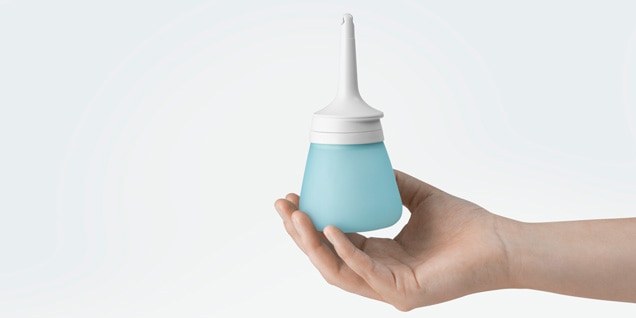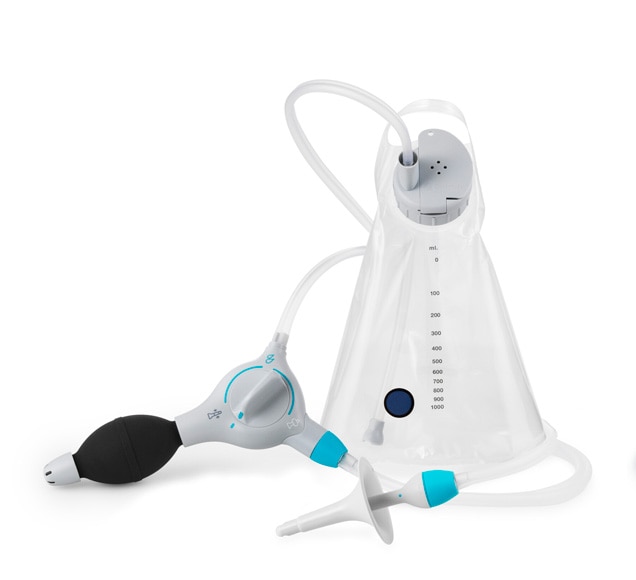You are not alone if you are living with symptoms related to a bowel disorder. From chronic constipation to experiencing accidents, bowel issues are surprisingly widespread. In fact, over 40% of the global population grapple with some form of functional gastrointestinal disorder1.
Becky, who lives with bowel issues, understands how difficult it can be.
“The bowel accidents were frustrating and depressing. The reality that you can’t control your bowel movements is maddening.”

Now, Becky performs transanal irrigation to manage her bowel issues.
There are many different treatment options available, including transanal irrigation. This article explains what transanal irrigation (TAI) is and how it can help to bring relief from bowel issues.
What is transanal irrigation?
Transanal irrigation (TAI) is a procedure for emptying the bowels and may be used instead of, or alongside other methods such as laxatives, suppositories, manual evacuation, and stimulation.
It involves introducing body-temperature water into the colon via the rectum with a soft and flexible catheter. This then helps with the evacuation of stool from your bowel. This irrigation process is done while sitting on the toilet.
TAI can help you to empty your bowel and remain continent between irrigations2. It can provide relief for patients who suffer from constipation and faecal incontinence and should be performed regularly.
TAI is an effective bowel management method which can be administered on your own or with the assistance of a caregiver. It enables you to decide when and where you want to empty your bowel. Following your prescribed irrigation routine, TAI can enable you to gain more control of your bowel management.
Before starting transanal irrigation, you would need to be examined and trained by a clinician to ensure your safety.
Different types of transanal irrigation
Transanal irrigation can be split into two distinct types: high-volume solutions and low-volume solutions. This refers to how much water is used during the irrigation. Low-volume systems generally deliver less than 250 ml of water to the bowel, whilst high-volume systems work with more than 250 ml3.
Understand the different types of TAI
Coloplast offers two TAI systems, Peristeen® Light for low-volume TAI, and Peristeen® Plus for high-volume TAI.
Explore Peristeen
Key benefits of using Peristeen Light (low-volume TAI)
Peristeen Light is designed to help you manage faecal incontinence or constipation. It has been designed to help people who struggle with defaecation and/or find that they leak stool during their day. As a small transanal irrigation system, Peristeen light is designed to fit easily into everyday day life and can be used both at home and on the go.
Peristeen Light brings relief.

Key benefits of using Peristeen Plus (high-volume TAI)
Regularly irrigating your bowel with water using Peristeen Plus is effective, but it may take time to settle into a good routine that works for you and your body. It may take your body a while to adjust to a new bowel management method. The best results are achieved when using Peristeen Plus on a regular basis.

Compared with conservative bowel management treatments, Peristeen Plus:
- Reduces symptoms of constipation or faecal incontinence for up to 2 days4
- Reduces time spent on bowel management when compared to conservative treatments
- Offers freedom to decide where and when to irrigate for a more predictable bowel control.
Sarah’s experience
Sarah, 28, was born with Spina Bifida. A Peristeen® user since 2015, Sarah found the irrigations challenging at first, but she persevered. One of the keys to her success was establishing some basic actions that she could repeat every irrigation. Now, with transanal irrigation, she has better control over her bowel.
“Peristeen has given me control of something I have never had control of. I know how long the procedure takes for me now so I pass the time by watching a TV show on my phone.” – Sarah, TAI user.

- Sperber A D, Bangdiwala S I, Drossman D A, et al. Worldwide Prevalence and Burden of Functional Gastrointestinal Disorders, Results of Rome Foundation Global Study. Gastroenterology. 2021;160(1):99–114.e3.
- Emmanuel AV, Krogh K, Bazzocchi G, et al. Consensus review of best practice of transanal irrigation in adults. Spinal Cord. 2013;51:732–738.
- Magnuson FS, Christensen P, Krassioukov A, et al. Neurogenic Bowel Dysfunction in Patients with Spinal Cord Injury and Multiple Sclerosis—An Updated and Simplified Treatment Algorithm. Journal of Clinical Medicine. 2023;12(6971).
- Christensen P, Bazzocchi G, Coggrave M, et al. A Randomized, Controlled Trial of Transanal Irrigation Versus Conservative Bowel Management in Spinal Cord-Injured Patients. Gastroenterology. 2006;131:738–747.



